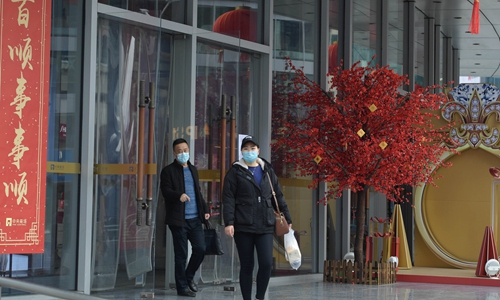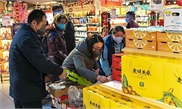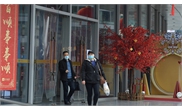
Two customers walk out of a shopping mall in Nanjing, East China's Jiangsu Province on February 19. Photo: cnsphotos
With health risks from the coronavirus outbreak ebbing in China, many provincial authorities have downgraded their emergency response levels, but this does not indicate the country's consumption has recovered accordingly, Chinese experts told the Global Times on Wednesday.Compared with near-zero consumption in the catering sector a couple of week s ago when the country adopted emergency measures to curb the spread of the deadly virus, consumption has shown some improving signs now, but a turning point has not arrived yet, they said.
Wan Zhe, chief economist with the China National Gold Group Corp, said that when consumption recovers to more than 80 percent of the level before the virus attack, it might be called a turning point.
"When the viral epidemic is cleared up in a month or two, the economy and consumption will surely bounce back," she told the Global Times.
Official data showed that control of the epidemic has yielded notable results. There were 406 new confirmed infections in China on Tuesday, including five cases from outside Hubei Province, representing single-digit growth for two consecutive days.
And, a task force of experts from the World Health Organization has said the epidemic in China peaked between January 23 and February 2 and it has been in decline since.
Liu Xuezhi, an economist at the Bank of Communications, told the Global Times on Wednesday the pressure on domestic consumption is easing which is expected to get back on its normal track in the second quarter.
By Wednesday, 13 provincial-level governments have lowered their emergency response levels from the top level to the second or third levels.
Northwest China's Qinghai Province was among the latest to lower the local emergency response from first-level to third-level and the adjustment took effect from midnight Wednesday.
A total of 181 disease control and check points in the province have been taken down so far and its highways have been fully opened, the local government said in a press conference on Wednesday.
A senior official with the National Development and Reform Commission, China's top economic planner, said on Tuesday that local governments can take more targeted approaches to curb the coronavirus. Excluding Hubei Province and the capital city of Beijing - other provinces with low risks are asked to fully resume business operations.
Chinese renowned respiratory scientist Zhong Nanshan, also head of a high-level expert team of the National Health Commission, said in an interview with CCTV on Monday that it is appropriate for some Chinese provinces to lower their emergency response levels.
"We need to be tough where it is needed and normalize things where it is appropriate, which is conducive to resuming production," said Zhong.
Since late January, all provincial-level regions in the Chinese mainland have activated top-level emergency responses to the COVID-19 virus, canceling mass events, shutting scenic attractions and suspending long-distance transportation.
However, with the disease's emergency levels coming down, some regions have witnessed crowds of people coming outdoors, sight-seeing at scenic resorts, shopping in supermarkets or lining up for a cup of coffee or milk tea.
"Such gatherings show disrespect for the front-line medics and workers who are fighting the coronavirus at the cost of their lives," a netizen named Chanyajing said on China's Twitter-like Weibo.




